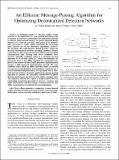An Efficient Message-Passing Algorithm for Optimizing Decentralized Detection Networks
Author(s)
Kreidl, Olivier Patrick; Willsky, Alan S.
DownloadWillsky_An efficient.pdf (671.8Kb)
PUBLISHER_POLICY
Publisher Policy
Article is made available in accordance with the publisher's policy and may be subject to US copyright law. Please refer to the publisher's site for terms of use.
Terms of use
Metadata
Show full item recordAbstract
A promising feature of emerging wireless sensor networks is the opportunity for each spatially-distributed node to measure its local state and transmit only information relevant to effective global decision-making. An equally important design objective, as a result of each node's finite power, is for measurement processing to satisfy explicit constraints on, or perhaps make selective use of, the distributed algorithmic resources. We formulate this multi-objective design problem within the Bayesian decentralized detection paradigm, modeling resource constraints by a directed acyclic network with low-rate, unreliable communication links. Existing team theory establishes when necessary optimality conditions reduce to a convergent iterative algorithm to be executed offline (i.e., before measurements are processed). Even so, this offline algorithm has exponential complexity in the number of nodes, and its distributed implementation assumes a fully-connected communication network. We state conditions under which the offline algorithm admits an efficient message-passing interpretation, featuring linear complexity and a natural distributed implementation. We experiment with a simulated network of binary detectors, applying the message-passing algorithm to optimize the achievable tradeoff between global detection performance and network-wide online communication. The empirical analysis also exposes a design tradeoff between constraining in-network processing to preserve resources (per online measurement) and then having to consume resources (per offline reorganization) to maintain detection performance.
Date issued
2010-02Department
Massachusetts Institute of Technology. Department of Electrical Engineering and Computer ScienceJournal
IEEE Transactions on Automatic Control
Publisher
Institute of Electrical and Electronics Engineers (IEEE)
Citation
Kreidl, O.P., and A.S. Willsky. “An Efficient Message-Passing Algorithm for Optimizing Decentralized Detection Networks.” IEEE Transactions on Automatic Control 55.3 (2010): 563–578. © Copyright 2010 IEEE
Version: Final published version
ISSN
0018-9286
1558-2523